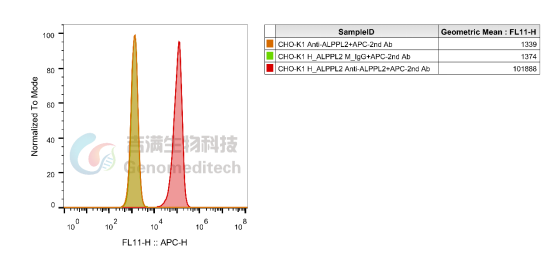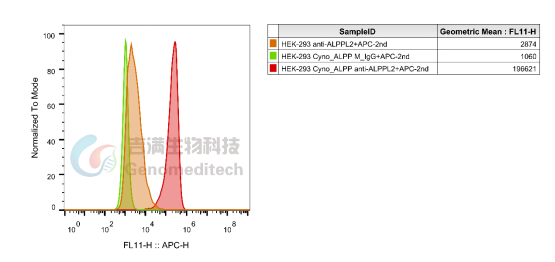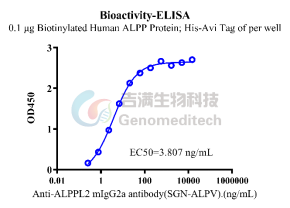产品编号:GM-58773AB
产品名称:Anti-ALPPL2 mIgG2a antibody(SGN-ALPV)
目录价:询价

产品编号:GM-58773AB
产品名称:Anti-ALPPL2 mIgG2a antibody(SGN-ALPV)
目录价:询价

GM-58773AB-10 10 μg
GM-58773AB-100 100 μg
GM-58773AB-1000 1mg
Species Reactivity Human; Cynomolgus
Clone SGN-ALPV
Source/Isotype Monoclonal Mouse IgG2a, κ
Application Flow cytometry;ELISA
Specificity Detects ALPPL2; ALPP
Gene ALPPL2; ALPP
Other Names ALPPL, ALPPL2, GCAP,ALP, ALPI, IAP, PALP, PLAP, PLAP-1
Gene ID ALPPL2: 251(human);ALPP: 250(human)、102133045(Cynomolgus)
Background Alkaline phosphatase, placental type also known as placental alkaline phosphatase (PLAP) is an allosteric enzyme that in humans is encoded by the ALPP gene. PLAP is a tumor marker, especially in seminoma and ovarian cancer. There are at least four distinct but related alkaline phosphatases: intestinal (ALPI), placental (this enzyme), placental-like (ALPPL2), and liver/bone/kidney (ALPL) (tissue-nonspecific). The first three are located together on chromosome 2, whereas the tissue-nonspecific form is located on chromosome 1. The coding sequence for this form of alkaline phosphatase is unique in that the 3' untranslated region contains multiple copies of an Alu family repeat. Alkaline phosphatase, placental type is a membrane-bound glycosylated dimeric enzyme, also referred to as the heat-stable form, that is expressed primarily in the placenta, although it is closely related to the intestinal form of the enzyme as well as to the placental-like form.
Storage Store at 2-8℃ short term (1-2 weeks).Store at ≤ -20℃ long term. Avoid repeated freeze-thaw.
Formulation Phosphate-buffered solution, pH 7.2.
Endotoxin < 1 EU/mg, determined by LAL gel clotting assay




产品编号:GM-58773AB
产品名称:Anti-ALPPL2 mIgG2a antibody(SGN-ALPV)
目录价:询价

GM-58773AB-10 10 μg
GM-58773AB-100 100 μg
GM-58773AB-1000 1mg
Species Reactivity Human; Cynomolgus
Clone SGN-ALPV
Source/Isotype Monoclonal Mouse IgG2a, κ
Application Flow cytometry;ELISA
Specificity Detects ALPPL2; ALPP
Gene ALPPL2; ALPP
Other Names ALPPL, ALPPL2, GCAP,ALP, ALPI, IAP, PALP, PLAP, PLAP-1
Gene ID ALPPL2: 251(human);ALPP: 250(human)、102133045(Cynomolgus)
Background Alkaline phosphatase, placental type also known as placental alkaline phosphatase (PLAP) is an allosteric enzyme that in humans is encoded by the ALPP gene. PLAP is a tumor marker, especially in seminoma and ovarian cancer. There are at least four distinct but related alkaline phosphatases: intestinal (ALPI), placental (this enzyme), placental-like (ALPPL2), and liver/bone/kidney (ALPL) (tissue-nonspecific). The first three are located together on chromosome 2, whereas the tissue-nonspecific form is located on chromosome 1. The coding sequence for this form of alkaline phosphatase is unique in that the 3' untranslated region contains multiple copies of an Alu family repeat. Alkaline phosphatase, placental type is a membrane-bound glycosylated dimeric enzyme, also referred to as the heat-stable form, that is expressed primarily in the placenta, although it is closely related to the intestinal form of the enzyme as well as to the placental-like form.
Storage Store at 2-8℃ short term (1-2 weeks).Store at ≤ -20℃ long term. Avoid repeated freeze-thaw.
Formulation Phosphate-buffered solution, pH 7.2.
Endotoxin < 1 EU/mg, determined by LAL gel clotting assay



